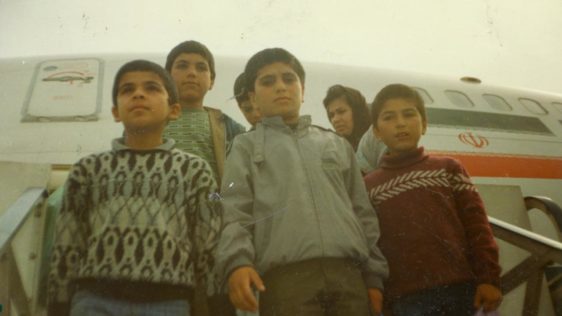“We Will Not Give Up Until They Pay”
The Abadeh Choir - the Art of Resistance against Hegemony
September 17th, 2016

The Abadeh Choir was a manifestation of the Revolution’s ideals, as people from all classes formed the choir; from a school caretaker, to a stuttering teenager and a soloist sharing one dream: to perform in front of the Imam. It echoed the voice of the Iranian people who shouted: “We will not give up until they pay” in the Imam’s presence, or when they sang in harmony: “God forbid that we die in disgrace” or “our motto is Ya Hussein, and martyrdom is our honor”. Their sweet Shirazi accent reflected their revolutionary honesty.
The Abadeh choir also tells the story of post-revolutionary art in Iran from 1981 to 1991. If it weren’t for individuals like Hashem Taleb (from the President’s public relations office) and his efforts, the choir would’ve never gained media coverage. A singing group that emerged away from the capital, Tehran, wouldn’t have been welcomed by some people. Those who in the 2009 strife in Iran said that only citizens of Tehran possess true common sense and understanding considered themselves the true voice of Iranians, whereas in actuality the voice of the Iranian people in its truest form came from the vocal cords of the Abadeh choir when they harmoniously sang: “I would sacrifice myself to save my religion.”
The choir was formed after the victory of the Revolution, and in line with the Revolution’s ideals. When the Revolution began to focus on education, the choir’s instructor decided to bring up a generation of religious and revolutionary youth by forming this singing group. Development and training were one of the most important issues of the Revolution and Ahmad Tavakkoli, the group’s instructor, felt the same way. He didn’t care whether the members had a golden voice, or whether they were handsome or not. He only cared about the upbringing of a revolutionary people, so he even let a stuttering teenager join the choir, just as the Revolution itself when everyone could join it. In the ten years the choir was active, Tavakkoli trained a lot of people.
The most popular members of the choir were most probably those who sang “Dad’s Story”, a song that became a lullaby for children whose fathers were fighting against the enemies of the people in the 80s. “Dad’s Story” brings out emotion in an epic that touched everyone’s hearts including the Imam’s. The choir’s performance in the Imam’s presence, was a reflection of Imam Khomeini’s deep conviction that the only acceptable art is one that stands in the face of hegemony; a point that those in Iran who fraudulently call themselves intellectuals never recognized. Perhaps it was only natural for the BBC to stand against the choir and display a violent image of their innocent faces, because it could never talk about their influence among the people.
“Dad’s Story” resonated in the hearts of people on an international level. According to the choir members, whenever they performed the song in other countries, people always connected with it and thanked them. The songs of the Abadeh choir represent a decade of sacrifice, resistance, and the love people everywhere felt for Imam Khomeini.

